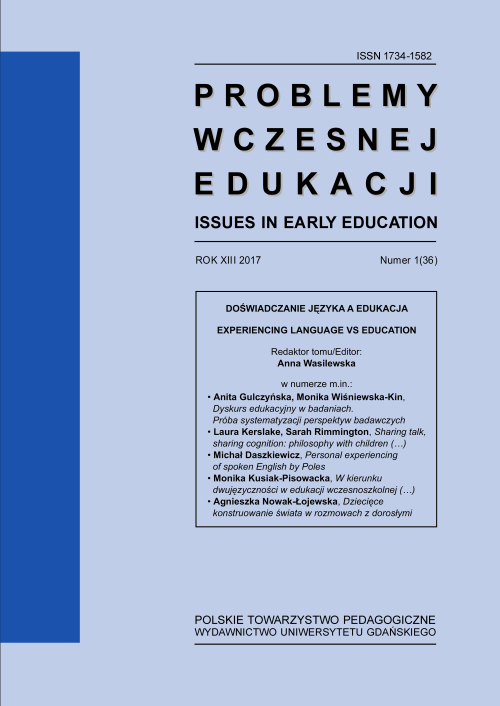Sharing talk, sharing cognition: philosophy with children as the basis for productive classroom interaction
DOI:
https://doi.org/10.5604/01.3001.0010.1995Keywords:
communicative competence, philosophy with children, classroom dialogue, exploratory talk, peer interactionAbstract
Taking the linguistic turn requires an examination of the relationship between thought and language: starting with Wittgenstein, we draw out the implications of expressing thought in a jointlyconstructed system of meaning. We then examine the relationship between thought and language in a pedagogical context by drawing on the practice of philosophy with children in the classroom, identifying key skills which are important in the development of meaningful classroom interaction, connecting this to philosophy with children practice. We go on to explore the consequences of educational attainment for those children who enter school with impoverished language, referring to a number of key studies, including our own, which highlight the detrimental effects not only on children’s outcomes at school, but also their ability to become equal inhabitants of a linguistic space. Therefore we argue that a focus on oracy skills crucially underpins wider outcomes. We conclude by looking at ways in which oracy skills can be developed in the classroom, arguing that although there are other techniques for developing oracy skills in the classroom, philosophy with children provides the most comprehensive way of doing this.Downloads
References
Mercer N. (2012), Exploratory talk – Professor Neil Mercer. [online] Slideshare.net. Available at:http://www.slideshare.net/margarubiosoto/exploratory-talk-in-professor-neil-mercer [Accessed 1 June 2016].
Mercer N. (2016), Introductory Session. Introduction given by Neil Mercer to the Oracy@Cambridge Conference Cambridge, UK.
Michaels S., O’Connor C. and Resnick L. (2007), Deliberative Discourse Idealized and Realized: Accountable Talk in the Classroom and in Civic Life. “Studies in Philosophy and Education”, 27(4). DOI: 10.1007/s11217-007-9071-1.
Nippold M., Frantz-Kaspar M., Cramond P., Kirk C., Hayward-Mayhew C. and MacKinnon, M. (2015). Critical Thinking About Fables: Examining Language Production and Comprehension in Adolescents. “Journal of Speech, Language and Hearing Research”, 58(2).
Oral S. (2012), Can Deweyan Pragmatist Aesthetics Provide a Robust Framework for the Philosophy for Children Programme? “Studies in Philosophy and Education”, 32(4).
Todorov T. (1984), Mikhail Bakhtin The Dialogical Principle. Manchester, Manchester University PressVansieleghem N. and Kennedy D. (2012), Philosophy for Children in Transition: Problems and Prospects. Chichester, West Sussex, Wiley-Blackwell.
Vygotsky L.S. (1978), Mind in Society: The development of higher psychological processes. Cambridge, MA, Harvard University Press.
Wittgenstein L. (1961), Tractatus logico-philosophicus. New York, Humanities Press.
Wittgenstein L., Wright G. and Nyman H. (1980), Culture and value. Chicago, University of Chicago Press.
Alexander R. (2000), Culture and Pedagogy: International Comparisons in Primary Education. Oxford, Blackwell.
Alexander R. (2004), Towards Dialogic Teaching: rethinking classroom talk. 4th ed. Cambridge, Dialogos.
Alexander R. (2010), Speaking but not listening? Accountable talk in an unaccountable context. “Literacy”, 44(3).
Askew M. (2012), Transforming Primary Mathematics. London, Routledge.
Ball S. (2003), The teacher’s soul and the terrors of performativity. “Journal of Education Policy”, 18(2). Boaler J. (1999), Participation, Knowledge and Beliefs: A Community perspective on Mathematics Learning. “Educational Studies in Mathematics”, 40(3).
Cassidy C. and Christie D. (2013), Philosophy with children: talking, thinking and learning together. “Early Child Development and Care”, 183(8). DOI: 10.1080/03004430.2013.773509Cazden C. (2001), Classroom Discourse The Language of Teaching and Learning. 2nd ed. Portsmouth, NH: Heinemann.
Dewey J. (1933), How We Think: A Restatement of the Relation of Reflective Thinking to the Educative Process. Boston, MA, Heath.
Education Endowment Foundation (2015), Philosophy for Children: Evaluation Report and Executive Summary. [online] Available at: https://educationendowmentfoundation.org.uk/uploads/ pdf/Philosophy_for_Children.pdf [Accessed: 1 June 2016].
Education Funding Agency (2016), Pupil Premium 2015–2016: Conditions of Grant – GOV.UK. [Online] Available at: https://www.gov.uk/government/publications/pupil-premium-2015-to-2016-allocations/pupil-premium-2015-to-2016-conditions-of-grant [Accessed 6 June 2016].
Education Scotland (2016), Collaborative learning – Research summaries – THE JOURNEY TO EXCELLENCE. [online] Available at: http://www.journeytoexcellence.org.uk/resourcesandcpd/ research/summaries/rscollaborativelearning.asp [Accessed 1 June 2016].
Hacker P.M.S. (2007), Analytic Philosophy: Beyond the linguistic turn and back again. In: M. Beaney (ed.), The Analytic Turn: Analysis in Early Analytic Philosophy and Phenomenology Routledge: London [online] Available at: http://info.sjc.ox.ac.uk/scr/hacker/docs/TheLinguisticTurn.pdf [Accessed 23 May 2016].
Hacker P.M.S. (2013), The Linguistic Turn in Analytic Philosophy. In Oxford Handbook for the History of Analytic Philosophy Oxford: University Press, pp. 926–47. [online] Available at: http://info.sjc.ox.ac.uk/scr/hacker/docs/TheLinguisticTurn.pdf [Accessed 23 May 2016].
Harré R. and Gillet G. (1994), The Discursive Mind, Thousand Oaks, Calif., Sage Publications.
Hart B., & Risley T.R. (1995), Meaningful differences in the everyday experience of young American children. Baltimore, P.H. Brookes.
Holquist M. (1990), Dialogism: Bakhtin and his world. London, Routledge.
International Baccalaureate® (2016), How the PYP Works [online] Available at: http://www.ibo.org/ programmes/primary-years-programme/what-is-the-pyp/how-the-pyp-works/ [Accessed 7 June 2016]International Baccalaureate® (2013), Learner Profile. [online] Available at: http://www.ibo.org/contentassets/fd82f70643ef4086b7d3f292cc214962/learner-profile-en.pdf [Accessed 7 June 2016].
Johnson D.W., & Johnson R. (1989), Cooperation and competition: Theory and research. Edina, MN, Interaction Book Company.
Johnson D.W., & Johnson R. (1999), Learning together and alone: Cooperative, competitive, and individualistic learning. 5th ed. Boston, Allyn & Bacon.
Johnson D.W., Johnson R. & Holubec E.J. (1994). The New Circles of Learning: Cooperation in the Classroom and School. Alexandria, VA, Association for Supervision and Curriculum Development.
Jorgensen H.V. (2009), Philosophy with Children in Religious Education – A Brief History. In: G. Yde Iversen, G. Mitchell, and G. Pollard (eds) (2009), Hovering over the face of the deep: philosophizing and theologising with children. Münster, Waxmann.
Lipman M. (2003), Thinking in Education. 2nd ed. Cambridge, Cambridge University Press.
Lipman M., Sharp A., Oscanyan F. (1980), Philosophy in the Classroom. 2nd ed. Philadelphia, Temple University Press.
Martens E (2009), Children’s Philosophy and Children’s Theology – A Family Resemblance. In: G. Yde Iversen, G. Mitchell, and G. Pollard (eds) (2009), Hovering over the face of the deep: philosophizing and theologising with children. Münster, Waxmann.
McLeod S., Sharp C., Bernardinelli D., Skipp A. and Higgins S. (2015), Supporting the Attainment of Disadvantaged Pupils: articulating success and good practice. Department for Education [online] Available at: https://www.gov.uk/government/uploads/system/uploads/attachment_data/file/473974/DFE-RR411_Supporting_the_attainment_of_disadvantaged_pupils.pdf [Accessed 24 May 2016].

 Academic Scientific Journals
Academic Scientific Journals





